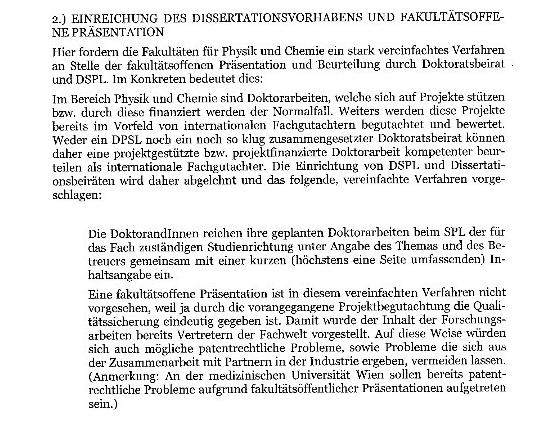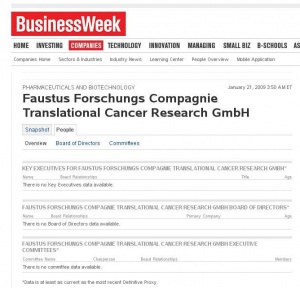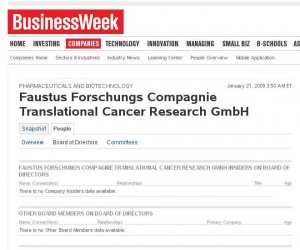Eigentum (OSP)
Inhaltsverzeichnis
Eine Glosse zu "open science"
Vorschlag zu einer Satzungsänderung (Univ. Wien), Ausschnitt
Ein Grund dieser Formulierungen:
Vergleiche dazu:
"In ersten, schon abgeschlossenen klinischen Studien erzielten Keppler und seine KollegInnen zusammen mit der beteiligten Firma Faustus AG Wien mit ihrem "Trojanischen Pferd" erfreuliche Ergebnisse."
Und hier ein aktueller Artikel zu Wissenschaft und Pharmaindustrie.
Öffentlichkeit:
lynx http://www.faustus.at Suche nach www.faustus.at Remote Host www.faustus.at nicht gefunden. Obacht: Verbindung zum remote Host konnte nicht hergestellt werden. lynx: Unzugängliche Startdatei http://www.faustus.at/
domain: faustus.at registrant: KB1942625-NICAT admin-c: KB1942625-NICAT tech-c: CAPI1725059-NICAT nserver: docks01.rzone.de remarks: 81.169.146.11 nserver: shades18.rzone.de remarks: 85.214.0.248 changed: 20051104 18:47:31 source: AT-DOM personname: Kynast Bernd organization: street address: An der Alten Fabrik 11 postal code: D-30629 city: Hannover country: Deutschland phone: +491725474446 e-mail: faustus-cie@t-online.de nic-hdl: KB1942625-NICAT changed: 20050709 04:33:29 source: AT-DOM personname: Hostmaster Strato Rechenzentrum organization: Cronon AG Professional IT-Services street address: Emmy-Noether-Str. 10 postal code: D-76131 city: Karlsruhe country: Deutschland phone: +4972166320307 fax-no: +4972166320303 e-mail: hostmaster@cronon-isp.net nic-hdl: CAPI1725059-NICAT changed: 20041110 17:16:41 source: AT-DOM
Zur historischen und ökonomischen Problemstellung:
- Tlw. Markierte und übersetzte Version von Paul A. David: Can 'Open Science' be protected from the evolving regime of IPR Protections?
- Er beschreibt (in den ersten Seiten) IMHO plausibel, dass es gute Gründe für die Einrichtung von Patenten und Copyrights gibt und dass sie eine Lösung auf eine bestimmte Art von 'unlauteren Wettbewerb' sind. Leider hat die Lösung aber ihre Tücken, die sich im Missbrauch von Monopolstellungen für Informationsgüter äußern. Dadurch, dass eine Kopie fast nichts kostet, andererseits jedoch verhältnismäßig teuer verkauft wird, werden viele Leute davon ausgeschlossen, an der Idee weiterzuarbeiten oder sie zu benutzen. (Das ist die sogenannte "dead weight burden of monopoly").--Andyk 17:09, 12. Jan. 2009 (CET)
Ronan Deazley
Ronan Deazley: Re-Thinking Copyright: History, Theory, Language (Cheltenham: Edward Elgar, 2006; 2008) S. 142ff, 160f
Review: Rethinking Copyright by Ronan Deazley
"However, this is not (primarily) the reason for bringing Penner's analysis to the fore. As we saw with the development and ultimate conclusion of the historical debate as to the existence or not of copyright at common law (in Chapter 3), the position adopted by Brougham and others was to be subverted and then obscured in the way in which the debate was subsequently recounted in the dominant texts of the late nineteenth century. Similarly, we can identify a comparable pathology in which Penner himself subverts his own conclusions as to intellectual property. Consider his following assertion:
While patents are not property rights in ideas, nor copyrights property rights in expressions, nor again trade marks property rights in symbols or words, in general it does no harm to speak of rights in ideas, or in manuscripts or in marks. any more than it does to refer to one's rights in one's labour.
- Vergleiche Dissertationsvereinbarungen an der Universität Wien: sie sollen einen Terminplan und einen Finanzplan enthalten. Finanzplan?
That is: intellectual properties are not properly property rights, they are monopoly grants, but for the sake of convenience let us refer to them as property rights; after all, it does no harm. In this however I would suggest that Penner is wrong: to elide the different concepts of receiving and holding a monopoly in an intangible and abstract object with the notion that that intangible abstract object is property can and does cause considerable harm.
ON COPYRIGHT'S TRAJECTORY, LANGUAGE AND DISCOURSE
Why call a monopoly granted by the state a property right? Why not call it a monopoly or indeed a privilege? One answer might be found in the correspondence between John Freke, a barrister and close friend of Edward Clarke (MP for Taunton), and John Locke discussing the progress of a Bill for the Better Regulating of Printing and Printing Presses through the House of Commons in March 1695. The Bill, which Clarke had been charged with the task of preparing, was brought before the House in anticipation of the imminent lapse of the Licensing Act 1662 in May of that same year. It failed for a number of reasons, although uppermost was the fact that it did not provide any security for the book trade — that is, the proposed legislation had omitted to afford the existing publishers and booksellers any exclusive rights of printing and selling books, as had been the case under the terms of the Licensing Act 1662.° There was much talk of the need to provide the booksellers' with a property in books, and of that discussion, Freke wrote to Locke as follows:
W]hen they are asked what they mean [by property] they can none of them give any good answer and if they would all speak out they (every party) mean differently. The Court means that it would be allowed the power of granting patents. The Stationers mean that they would have the regulation of property and disposal of it by making their Register the standard of it ... The Bishops mean I know not what hut they Chime in with the other two because they think property a very popular word, which Licensor is not.
'Property' certainly is a popular word, which `licensor' is not; the same might be said of `monopoly'. Certainly the World Organisation for Monopolies in Intangible Goods (WOMIG) has less cache than the World Intellectual Property Organisation (WIPO). Perhaps the founding fathers of WIPO realised as much when they launched the process of inculcating a now almost ubiquitous international discourse on all aspects of intellectual property rights. And yet, the phrase 'intellectual property rights' (or IPRs) is a useful and catchy umbrella term with which to capture an increasingly diverse and rapidly changing area of law; so, as Penner suggests, wherein lies the harm?
The harm lies in the creeping reification of the intellectual property domain which such language facilitates, as well as the dangerous and damaging conceptual closure that is endemic within that process."
...
"Moreover, as we continue to embrace this reification of copyright, with its rhetorical paradigm of copyright as property right qua human right, and allow it to dominate copyright's future trajectory, we lose the opportunity to engage in other, arguably more appropriate forms of copyright discourse. One of the profoundly undesirable results of this conceptual juggernaut is that it operates to occlude other models of conceiving of, and talking about, intellectual property, at least within the realms of the policymaker, the legislature, and the judiciary. In short, it precludes what Waldron has referred to as any form of `oppositional analysis', despite that, as we have seen, it has little defensible historical or theoretical provenance. Historically, the conceit of common law copyright was definitively rejected not once but twice. From a theoretical perspective, as argued above, if copyright is anything, it is a thing which is akin to a chose in action that nevertheless functions like a property right in rem — an institutional fact determining the existence of a state sanctioned monopoly. It adheres to no rational understanding of the notion of excludability in that once publicised (whether orally or captured in tangible form) it is beyond the power of an author to exclude others from making use of his or her original expression; nor will use by another exhaust the original expression or prevent either the author (or indeed anyone else) making an exactly identical and concurrent use of the same. Neither does it accord with any sensible concept of separability. An author's original expression, by definition, cannot be given, traded or licensed to another so as to become the original expression of that other — the original expression must always be contingent upon, and so linked to, its originating author.
Both historical and theoretical analyses suggest that the logical manner in which to discuss intellectual property is not that the user (or the state on behalf of the user) should have to articulate, defend and pay for every action which encroaches upon the author's property, but rather that the author or owner (or the state on behalf of the same) should have to articulate and defend every monopoly use of the intangible good which encroaches upon the public's freedom to engage with that intangible good. This, of course, is not the current copyright paradigm; nor is it an analysis for which the language of current copyright discourse allows sufficient room. What is needed is a new terminology."
Mark A. Lemley
Marc A. Lemley: Property, Intellectual Property, and Free Riding
Siehe auch
Michele Boldrin and David K. Levine: Against Intellectual Monopoly
The Promise of a Post-Copyright World
Primary Sources on Copyright (1450-1900)
zurück zu Open Source Philosophie (Vorlesung Hrachovec, Winter 2008)




